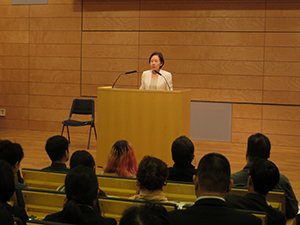- HOME >
- NEWS >
- Josai Invites American Philosopher Richard J. Bernstein for Keynote Lecture to Honor 50th Anniversary


On June 8, 2016, the Josai University Educational Corporation (Noriko Mizuta, Chancellor) hosted a special keynote lecture by American philosopher Richard J. Bernstein entitled “Hannah Arendt: Thought Defying Evil” in the 1st building auditorium of Josai’s Tokyo Kioicho Campus. Organized as part of Josai’s 50th anniversary festivities, around 150 attendees (including researchers, faculty, and students) attended this special lecture from this world-renowned philosopher.
Richard J. Bernstein is currently a Professor of Philosophy and former Director of Graduate Studies at the New School in New York. During a long career at Yale and Harvard Universities, Prof. Bernstein published numerous works that address issues concerning European metaphysics and critical theory.
The key person in Prof. Bernstein’s lecture, Hannah Arendt (1906-75), was born in Germany into a Jewish family of social democrats. She went on to study with philosopher Martin Heidegger at university. During World War II, Arendt managed to escape from the Nazi concentration camps, eventually moving to the United States where she passed away in 1975. In 1951, Arendt published The Origins of Totalitarianism which gain wide acclaim, thereby establishing her place in the field of philosophy. Arendt later took teaching positions at American universities such as Princeton and Harvard. She was sharply criticized for her reporting on the 1960 trial of Adolf Eichmann, one of the main organizers of mass deportation and execution of Jews under the Nazis, and she was even accused of being an “Eichmann sympathizer” by certain members of the Jewish-American community.
Chancellor Mizuta made introductory remarks before the lecture, stating, “It is a great honor to welcome such a world-renowned philosopher to our university. Genocide left a deep wound on the 20th century. I believe that today’s lecture will interrogate the ethics of this issue and provide some valuable insight that will inform our future.”

Professor Mizuta makes introductory remarks
In his lecture, Prof. Bernstein considered what Arendt termed the “banality of evil” in her reports of the Eichmann trial. He clarified Arendt’s stance by stating that, “If ordinary individuals suspend critical judgement and blindly follow orders, then they become accomplice in doing evil acts such as the Holocaust. It is the suspension of critical thinking that generates evil.” Prof. Bernstein also linked his ideas with the current climate in the United States. “One gets a similar feeling when hearing the things said about Islam today. It is wrong to think in binary terms of right or wrong. Rather than suspending individual judgement, you must stop and think for yourself. This is of the utmost importance in resisting evil,” he said. During the Q&A session that followed, Prof. Bernstein politely answered questions from exchange students and other participants.
|
Prof. Bernstein delivers |
Prof. Bernstein receives |
Earlier that morning, Prof. Bernstein’s spouse, Carol L. Bernstein, Professor at Bryn Mawr College, gave a lecture entitled “The Performing of Cultural Memory” in the 3rd building’s International Conference Room on Josai’s Kioicho campus. The lecture, which was attended by roughly 100 students and faculty members, analyzed issues of tragedy and memory contained in literary and cinematic representations of historical events such as the Holocaust and the atomic bombing of Hiroshima.
|
Prof. Carol Bernstein delivers her lecture |
A commemorative photo with |
